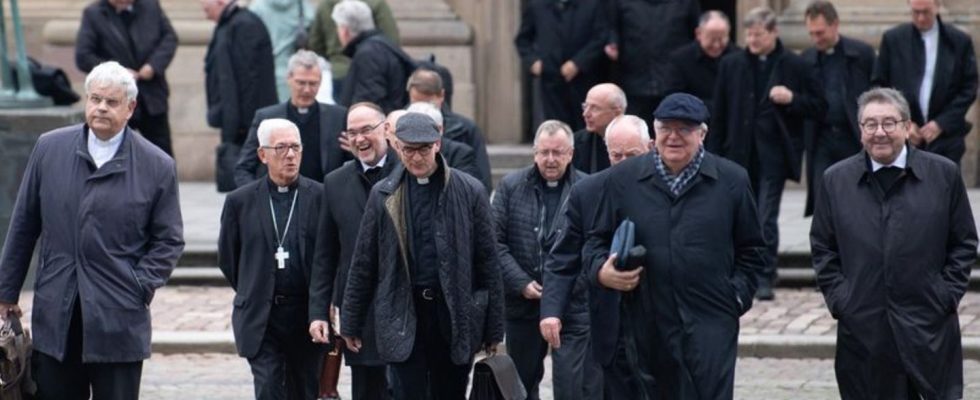Church
Abuse, reform backlog, AfD: Catholic bishops advise
Bishops at the autumn general assembly of the German Bishops’ Conference 2022 in Fulda: This time they are meeting in Wiesbaden. photo
© Sebastian Gollnow/dpa
The autumn meeting of the bishops is approaching: the abuse scandal has presumably spread to a cardinal, the hoped-for reforms are stalling – and then there is the AfD.
Abuse scandal and reform process
The abuse scandal took on a new dimension last week when a cardinal came into the picture as a suspected perpetrator for the first time. The Ruhr Bishop Franz Hengsbach, who died in 1991, is said to have, among other things, abused a 16-year-old during his time as auxiliary bishop in Paderborn.
He is also accused of another attack on a woman in Essen in 1967. As it turned out, at least some of the allegations had been known internally for a long time.
In response to the abuse scandal, the Catholic Church in Germany initiated a reform process in 2019, the Synodal Way. The aim was to change the structures that had encouraged abuse for decades. This process was concluded in March with reform proposals. This brought the German Church into conflict with the Vatican, which rejected almost all German proposals for renewal.
Anger among each other too
Really far-reaching reforms such as opening up the priesthood to women were not even proposed because there would have been no chance of doing so anyway. A majority of the bishops’ conference wants to continue the dialogue with the so-called lay people – the non-clergy – that was practiced during the reform process.
For this purpose, a Synodal Committee and then a permanent Synodal Council are planned. However, conservative bishops such as Rainer Maria Woelki from Cologne and Rudolf Voderholzer from Regensburg have blocked the funds for this. That’s why there is sometimes a bad atmosphere among the bishops.
Upcoming World Synod and AfD
The autumn general assembly will also focus on the World Synod, which will meet in Rome from October 4th to 29th. Pope Francis invited people to this meeting in order to talk about the future of the church on the broadest possible basis and to try out new ways of working together. The Germans would like to bring their concerns and ideas from the Synodal Way into this process, but concrete reforms are not even being considered by the World Synod.
In addition, the bishops also deal with current issues, including their stance on the AfD. The Augsburg Bishop Bertram Meier caused severe irritation here last week.
In the “Augsburger Allgemeine” he said, among other things, that he appealed to everyone to study party programs and deal with individual candidates. The sentence in particular was criticized: “Like the church, the AfD advocates, for example, the protection of unborn life or the marriage of a man and a woman – and yet we as a church cannot narrow our perspective to such overlaps.”
The canon lawyer Thomas Schüller accused Meier of making himself “a stirrup holder for broader social acceptance of right-wing radicals.” Theology professor Daniel Bogner said that this attitude reminded him of the positioning of the Catholic Church towards Hitler’s Nazi government in 1933: “It was also emphasized back then that the Reich government represented individual positions that were important to the church, for example the right to self-organization of the church or freedom from schools.”

